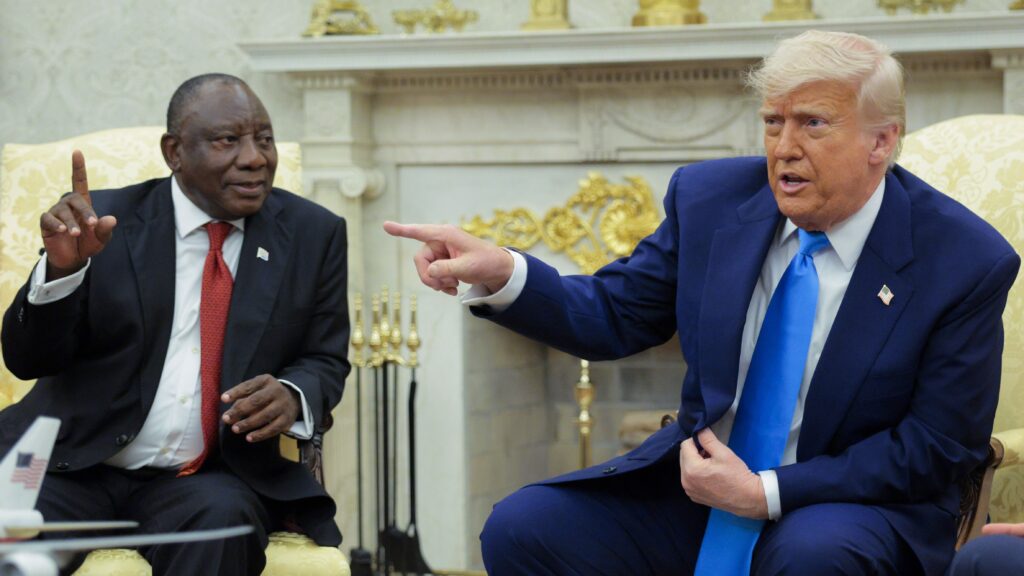South Africans Divided Following Trump-Ramaphosa Encounter
In an astonishing confrontation, former President Donald Trump took it upon himself to address issues facing South Africa, particularly those concerning the Afrikaner community, during a recent meeting with President Cyril Ramaphosa. Trump’s remarks have fueled further divisions among South Africans and highlighted ongoing tensions around race and governance.
An Unexpected Twist in the Oval Office
Trump described the meeting’s dynamics as he confronted Ramaphosa, asserting that Afrikaners are experiencing persecution in their homeland. This statement was met with swift reactions from various factions in South Africa, especially from right-wing political groups such as the Solidarity Movement, who celebrated Trump’s intervention as a significant moment in highlighting South Africa’s struggles on an international platform.
Ernst Roets, a prominent figure among Afrikaner nationalists, expressed his approval on social media, stating, “Donald Trump made history today.” He praised the U.S. president for showcasing videos that depict provocative statements from opposition politician Julius Malema, who has been controversial for his remarks about Afrikaners and farmers.
Criticism and Defense of Government Actions
Despite support from some right-wing factions, many South Africans condemned these groups for seeking outside intervention rather than working to resolve issues internally. Critics argue that the country’s governing coalition, which includes multiple parties representing diverse racial and ideological groups, is committed to addressing high crime rates and staggering unemployment, which currently sits at 32%, particularly affecting the black population.
The Government’s Response
During the tense exchange in the White House, Ramaphosa maintained his composure while countering Trump’s claims. South Africans were largely appreciative of Ramaphosa’s diplomatic approach. Notably, the delegation included John Steenhuisen, leader of the Democratic Alliance (DA) and South Africa’s highest-ranking white politician. He acknowledged the existing safety challenges in the country but emphasized that “the majority of South Africa’s commercial and smallholder farmers really do want to stay in South Africa and make it work.”
Perspectives on Crime and Governance
Trump’s presentation also spotlighted the Economic Freedom Fighters (EFF) and their advocacy for radical changes in land ownership. The party’s use of the “Shoot the Boer” song, an anti-apartheid anthem turned political statement, has drawn attention and fueled divisions. Although the South African Supreme Court has ruled that the song’s lyrics are understood contextually rather than literally, right-wing groups have consistently attempted to have it banned.
Ramaphosa defended the existence of the EFF, arguing that the party has a right to express its views within the confines of democracy, despite the government’s opposition to Malema’s ideologies. Steenhuisen added that the DA formed alliances to counteract the EFF’s influence and to help achieve national progress.
Responses and Reactions
The Oval Office meeting triggered a mixed bag of reactions from various sectors of South African society. While some politicians and business leaders praised Ramaphosa’s tactfulness, others expressed concerns regarding the implications of Trump’s comments and the way they may bolster extreme and divisive narratives.
Crime Beyond Racial Boundaries
South African trade unionist Zingiswa Losi pointed out that the issue of crime transcends racial lines, emphasizing that efforts to tackle violence must focus on creating employment and addressing underlying social issues. Her passionate plea highlighted the devastating reality faced by many in impoverished communities, particularly where crime rates are exceedingly high.
| Aspect | Details |
|---|---|
| Meeting Location | Oval Office, White House |
| Key Figures Present | Donald Trump, Cyril Ramaphosa, John Steenhuisen |
| Main Topic | White farmers’ persecution and South Africa’s economic challenges |
| Political Groups Involved | Solidarity Movement, DA, EFF |
| Crime Rate | Unemployment at 32%; High crime affecting all demographics |
Conclusion
The ramifications of the Trump-Ramaphosa meeting are likely to reverberate across South African society, highlighting the complexities of race relations, crime, and political discourse. As the nation grapples with these challenges, the call for unity amid growing divisions remains more crucial than ever.


